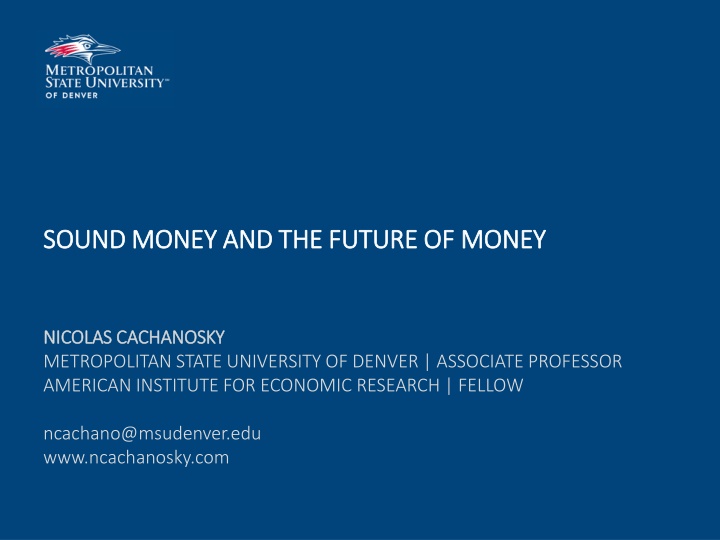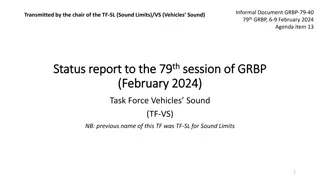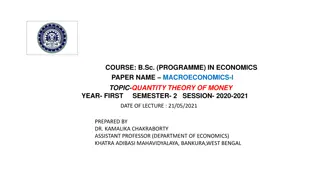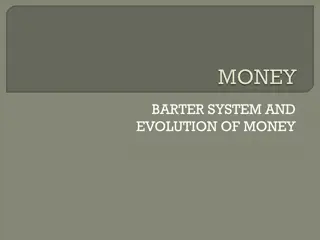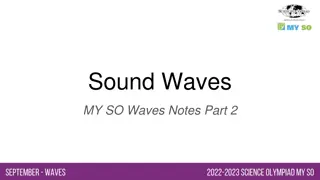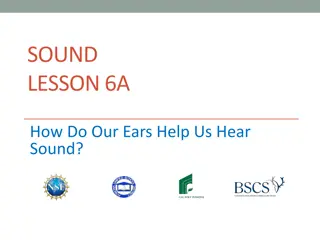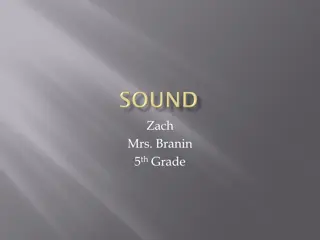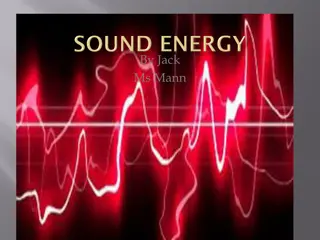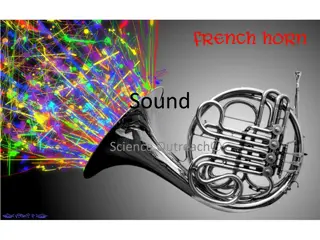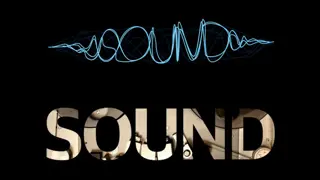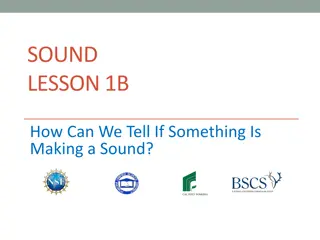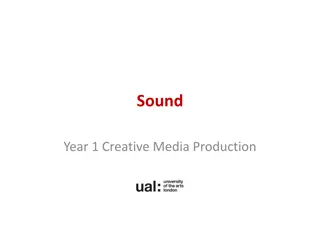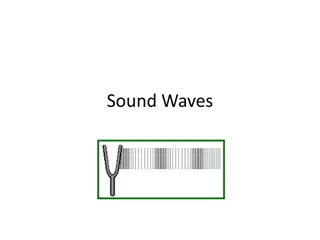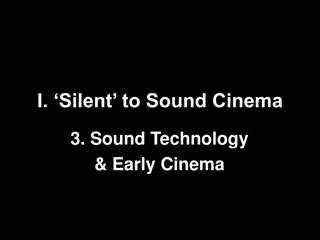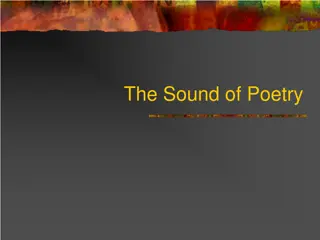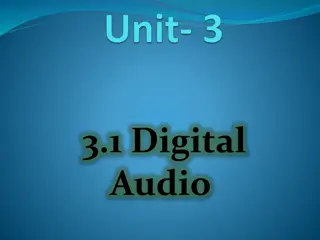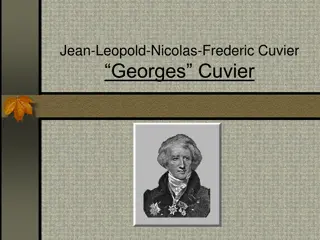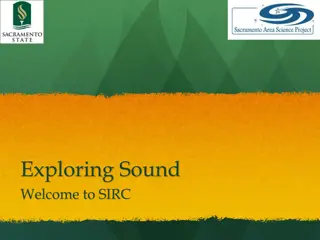Sound Money and the Future of Money by Nicolas Cachanosky
Sound money ensures monetary equilibrium where money demand equals money supply, essential for a stable economy. Explore the evolution of monetary institutions, cashless economies, and cryptocurrencies with Professor Nicolas Cachanosky's insightful perspective on the future of money.
Download Presentation

Please find below an Image/Link to download the presentation.
The content on the website is provided AS IS for your information and personal use only. It may not be sold, licensed, or shared on other websites without obtaining consent from the author.If you encounter any issues during the download, it is possible that the publisher has removed the file from their server.
You are allowed to download the files provided on this website for personal or commercial use, subject to the condition that they are used lawfully. All files are the property of their respective owners.
The content on the website is provided AS IS for your information and personal use only. It may not be sold, licensed, or shared on other websites without obtaining consent from the author.
E N D
Presentation Transcript
SOUND MONEY AND THE FUTURE OF MONEY SOUND MONEY AND THE FUTURE OF MONEY NICOLAS CACHANOSKY NICOLAS CACHANOSKY METROPOLITAN STATE UNIVERSITY OF DENVER | ASSOCIATE PROFESSOR AMERICAN INSTITUTE FOR ECONOMIC RESEARCH | FELLOW ncachano@msudenver.edu www.ncachanosky.com
OUTLINE What is Sound Money? The Evolution of Monetary Institutions The Future of Money Cashless economies Crypto-currencies 2 SOUND MONEY AND THE FUTURE OF MONEY SOUND MONEY AND THE FUTURE OF MONEY Nicolas Cachanosky | ncachano@msudenver.edu | www.ncachanosky.com Nicolas Cachanosky | ncachano@msudenver.edu | www.ncachanosky.com
WHAT IS SOUND MONEY? A sound monetary system sound monetary systemis one that manages to achieve and keep monetary equilibrium What is monetary equilibrium? When money demand ??equals money supply ?? Let us use the equation of exchange as our analytical framework Then, monetary equilibrium means that money supply (?) times money velocity (the inverse of money demand) (?) should be constant (in per capita terms) ?? = ?? %? = %? Note that Monetary equilibrium (sound money) is different different from price level stability ?? = ?? ?? ? ? = %? = %? %? If ? changes (productivity gains), then money supply needs to increase even if does not change %? = 0 even if money demand 4 SOUND MONEY AND THE FUTURE OF MONEY SOUND MONEY AND THE FUTURE OF MONEY Nicolas Cachanosky | ncachano@msudenver.edu | www.ncachanosky.com Nicolas Cachanosky | ncachano@msudenver.edu | www.ncachanosky.com
WHAT IS SOUND MONEY? Two conceptions of money neutrality In the long long- -run run, relative prices remain unchanged But what if a monetary shock produces a shift to either demand or supply of different goods? This type of money neutrality is an assumption more than a real world fact The monetary policy that achieves and maintains monetary equilibrium It is not about relative prices; it is about equilibrium in the money market Three examples NGDP Targeting Hayek s rule McCallum s rule How well did different monetary regimes performed in terms of monetary equilibrium and what are the challenges ahead? 5 SOUND MONEY AND THE FUTURE OF MONEY SOUND MONEY AND THE FUTURE OF MONEY Nicolas Cachanosky | ncachano@msudenver.edu | www.ncachanosky.com Nicolas Cachanosky | ncachano@msudenver.edu | www.ncachanosky.com
THE EVOLUTION OF MONETARY INSTITUTIONS Simple timeline Cashless economy? Commodity money Gold Exchange Standard Free banking Classic gold standard Fiat money (no banks) Crypto- currencies? Private (free market) money Mix: Private and state money State money 7 SOUND MONEY AND THE FUTURE OF MONEY SOUND MONEY AND THE FUTURE OF MONEY Nicolas Cachanosky | ncachano@msudenver.edu | www.ncachanosky.com Nicolas Cachanosky | ncachano@msudenver.edu | www.ncachanosky.com
THE EVOLUTION OF MONETARY INSTITUTIONS Monetary regimes comparative dynamics Commodity money (no banks) ?? = ?? Not very good at keeping ?? in the short-run Free banking ??? = ?? Quick adjustment of money supply due to bank competition and clearing Classic gold standard ??? = ?? Slow adjustment of money supply (only central banks issue convertible banknotes) Fiat money ??? = ?? Money supply is super-elastic Central banks can print high power money (as if they can print gold ) Absence of a market (endogenous) monetary anchor Price level, exchange rate, interest rate, etc 8 SOUND MONEY AND THE FUTURE OF MONEY SOUND MONEY AND THE FUTURE OF MONEY Nicolas Cachanosky | ncachano@msudenver.edu | www.ncachanosky.com Nicolas Cachanosky | ncachano@msudenver.edu | www.ncachanosky.com
THE EVOLUTION OF MONETARY INSTITUTIONS Some stylized facts Free banking Inherently stable (look at the cases of free banking in Scotland, Canada, and Australia) Bank runs were rational and limited to insolvent banks Free banking did not fail, it was taken over by government financial needs The U.S. is not is not an example of free banking Gold standard Low inflation (2-percent annually during the price revolution) Inflation periods coincide with armed conflicts and wars (issue of banknotes and temporary suspension of convertibility), not with unexpected gold shocks Save for exceptions, gold shocks were a response to increases in money demand (equilibrating shocks) Gold standard did not cause the Great Depression This regime stopped working de facto during WWI The Federal Reserve was following the Real Bills Doctrine, not the gold standard rules of the game. 9 SOUND MONEY AND THE FUTURE OF MONEY SOUND MONEY AND THE FUTURE OF MONEY Nicolas Cachanosky | ncachano@msudenver.edu | www.ncachanosky.com Nicolas Cachanosky | ncachano@msudenver.edu | www.ncachanosky.com
THE EVOLUTION OF MONETARY INSTITUTIONS Some stylized facts (continued) Free banking and Gold Standard Most cases of deflation are not cases of depressions Productivity shocks ?? ?? ? are not ?? = ? ? ? ?? = ? ? ?,?? ? < 0 ?? ? ? > 0 10 SOUND MONEY AND THE FUTURE OF MONEY SOUND MONEY AND THE FUTURE OF MONEY Nicolas Cachanosky | ncachano@msudenver.edu | www.ncachanosky.com Nicolas Cachanosky | ncachano@msudenver.edu | www.ncachanosky.com
THE EVOLUTION OF MONETARY INSTITUTIONS Fiat money (U.S. case) Drop the learning years of the Fed (Great Depression and inter-war years) The Fed does not does not outperform the pre-Fed monetary regime (which was less efficient than a free banking regime) The 2008 crisis was a worse crisis than the crises that motivated an institutional reform and the creation of the Fed Yet, no discussion has taken place about what monetary reforms are needed This lack of discussion about institutional reforms sets a divergent path in the future of money More of the same: Cashless economies Radical change from outside the government: Crypto-currencies (currency competition) 11 SOUND MONEY AND THE FUTURE OF MONEY SOUND MONEY AND THE FUTURE OF MONEY Nicolas Cachanosky | ncachano@msudenver.edu | www.ncachanosky.com Nicolas Cachanosky | ncachano@msudenver.edu | www.ncachanosky.com
CASHLESS ECONOMIES Proposal Eliminate cash Only electronic money (deposits) should be used Elimination of cash should be a gradual policy only in developed economies Arguments Policy (when in the lower zero bound) If there is no cash, then central banks can tax bank balances (hoarding of money) through negative interest rates Incentivize consumption over savings Ethical Helps fight crimes such as prostitution, arms and drugs dealers, tax evasion, etc. 14 SOUND MONEY AND THE FUTURE OF MONEY SOUND MONEY AND THE FUTURE OF MONEY Nicolas Cachanosky | ncachano@msudenver.edu | www.ncachanosky.com Nicolas Cachanosky | ncachano@msudenver.edu | www.ncachanosky.com
CASHLESS ECONOMIES Dissenting points Policy Being at the zero lower bound does not mean the central bank is lacking ammunition: Remember Q1, Q2, and Q3? Incentivize production over consumption Using only bank accounts can be expensive (especially for low income population) Bank transfers are not free (fees, transaction lags, etc.) Ethical Overestimation of cash used for criminal activities Not all unreported unreported cash is used in criminal activities Do all crimes destroy wealth? Should vices be considered crimes? Loss of privacy Central banks should be at the service of individuals People do not have to explain why they want to hold cash 15 SOUND MONEY AND THE FUTURE OF MONEY SOUND MONEY AND THE FUTURE OF MONEY Nicolas Cachanosky | ncachano@msudenver.edu | www.ncachanosky.com Nicolas Cachanosky | ncachano@msudenver.edu | www.ncachanosky.com
CASHLESS ECONOMIES Dissenting points Institutional It is not the same if the public preferences move towards a cashless economy than if the central bank forces forces a move towards a cashless economy Central banks should accommodate to the public preferences instead of imposing its own upon the public If the argument to support a forced forced moment towards a cashless economy is that (a) helps fight crime and/or (b) makes monetary policy easier for central bankers; to what else does this argument apply? 16 SOUND MONEY AND THE FUTURE OF MONEY SOUND MONEY AND THE FUTURE OF MONEY Nicolas Cachanosky | ncachano@msudenver.edu | www.ncachanosky.com Nicolas Cachanosky | ncachano@msudenver.edu | www.ncachanosky.com
CRYPTO-CURRENCIES Paradigmatic case: Bitcoin Starts during the 2008 financial crisis Negative view of central banks, but also of commercial banks It is not just about a non-central bank money, but also about money without banks Distinctive benefit of Bitcoin and crypto-currencies Allow for peer-to-peer digital digital transaction without Save on transaction costs Crypto-currencies They operate in a competitive environment Can crypto-currencies become money (commonly accepted means of exchange -CAMOE)? Even if this is not the original motivation of Bitcoin and other crypto-currencies without intermediaries 18 SOUND MONEY AND THE FUTURE OF MONEY SOUND MONEY AND THE FUTURE OF MONEY Nicolas Cachanosky | ncachano@msudenver.edu | www.ncachanosky.com Nicolas Cachanosky | ncachano@msudenver.edu | www.ncachanosky.com
CRYPTO-CURRENCIES Challenges for crypto-currencies to become CAMOE Network effects Money is a network good: ? ? = ? + ? log ? If crypto-currencies do not reach a threshold of network users ? , then it will not take-off How to expand the network: Intermediaries between consumer and supplier Examples of typical network goods Telephones Fax machines Facebook Twitter Instagram ?(?) ? ? 19 SOUND MONEY AND THE FUTURE OF MONEY SOUND MONEY AND THE FUTURE OF MONEY Nicolas Cachanosky | ncachano@msudenver.edu | www.ncachanosky.com Nicolas Cachanosky | ncachano@msudenver.edu | www.ncachanosky.com
CRYPTO-CURRENCIES Challenges for crypto-currencies to become CAMOE Scalability constraint Bitcoin can process only a small number of transactions per second Miner fees during peak times Starts to look like a bank (wire) transfer with fees (the same thing to be avoided in the first place) VISA PayPal Bitcoin 24,000 193 7 20 SOUND MONEY AND THE FUTURE OF MONEY SOUND MONEY AND THE FUTURE OF MONEY Nicolas Cachanosky | ncachano@msudenver.edu | www.ncachanosky.com Nicolas Cachanosky | ncachano@msudenver.edu | www.ncachanosky.com
CRYPTO-CURRENCIES Challenges for crypto-currencies to become CAMOE The monetary rule problem Sound monetary rule: ?? = ?? Most crypto-currencies monetary rule: ?? = ?? Money supply is (too) inelastic Money supply does not react to changes in demand This fixed supply rule produces monetary disequilibria (not a sound money rule ) 21 SOUND MONEY AND THE FUTURE OF MONEY SOUND MONEY AND THE FUTURE OF MONEY Nicolas Cachanosky | ncachano@msudenver.edu | www.ncachanosky.com Nicolas Cachanosky | ncachano@msudenver.edu | www.ncachanosky.com
CRYPTO-CURRENCIES 22 SOUND MONEY AND THE FUTURE OF MONEY SOUND MONEY AND THE FUTURE OF MONEY Nicolas Cachanosky | ncachano@msudenver.edu | www.ncachanosky.com Nicolas Cachanosky | ncachano@msudenver.edu | www.ncachanosky.com
CRYPTO-CURRENCIES What is a Bitcoin-type crypto-currency good for? Financial speculation: Price volatility Again, was not this a feature to be avoided by the crypto-currency movement? The two monetary rules Bitcoin: Easy to code ?? = ?? Bitcoin alternative: (Very) Difficulty to code ?? = ?? This is achieved through market competition (free banking) or by a centrally managed money supplier (a central bank) Yet, crypto-currencies are designed to work without in the gold standard?) without banks (an incomplete inspiration 23 SOUND MONEY AND THE FUTURE OF MONEY SOUND MONEY AND THE FUTURE OF MONEY Nicolas Cachanosky | ncachano@msudenver.edu | www.ncachanosky.com Nicolas Cachanosky | ncachano@msudenver.edu | www.ncachanosky.com
CRYPTO-CURRENCIES Can crypto-banks emerge? Blockchain technology applied to smart-contracts Two parties (A and B) perform a number of transactions outside ledger and only report outstanding balances, for instance, once a week (the lightning network) This allows for faster transactions between these two parties Apply a security technology to the lightning network and use this as a money substitute A owns 10b to B B buys goods and services from C with A s debt (IOU) New monetary framework ??? = ?? Where ?are Bitcoin claims certified and issued by a crypto-bank Analogy: A crypto-based free banking outside the main Bitcoin 24 SOUND MONEY AND THE FUTURE OF MONEY SOUND MONEY AND THE FUTURE OF MONEY Nicolas Cachanosky | ncachano@msudenver.edu | www.ncachanosky.com Nicolas Cachanosky | ncachano@msudenver.edu | www.ncachanosky.com
CRYPTO-CURRENCIES Benefits of fiat money It is already stablished A gradual movement towards a cashless economy is feasible Challenges of crypto-currencies Need to rethink they money supply rule and how to properly code the monetary anchor (or rely on a group of monetary experts to decide their money supply policy) It is very difficult to break a network effect Can these two scenarios co-exist? Central banks move towards digital money and adopt a Blockchain-type technology Central banks allows individuals to have their own digital wallets Crypto-banknotes are issued by different financial institutions 26 SOUND MONEY AND THE FUTURE OF MONEY SOUND MONEY AND THE FUTURE OF MONEY Nicolas Cachanosky | ncachano@msudenver.edu | www.ncachanosky.com Nicolas Cachanosky | ncachano@msudenver.edu | www.ncachanosky.com
SOUND MONEY AND THE FUTURE OF MONEY SOUND MONEY AND THE FUTURE OF MONEY NICOLAS CACHANOSKY NICOLAS CACHANOSKY METROPOLITAN STATE UNIVERSITY OF DENVER | ASSOCIATE PROFESSOR AMERICAN INSTITUTE FOR ECONOMIC RESEARCH | FELLOW ncachano@msudenver.edu www.ncachanosky.com
